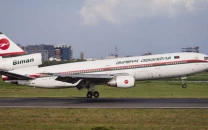Govt may increase fuel prices partially
Miftah backs targeted petrol subsidy to the poor

The government is likely to make a partial increase in oil prices to do away the subsidies in order to meet commitment with the International Monetary Fund (IMF) amid the highest impact of global oil prices on domestic oil rates in Pakistan.
The likelihood of a hike in oil prices emerged a day after Pakistan and the IMF agreed, in principle, to extend the stalled bailout programme by up to one year and increase the loan size to $8 billion. Subject to the final modalities, the global lender agreed that the programme will be extended by another nine months to one year as against the original end-period of September 2022, the sources added.
Following the rumours of an increase in prices of petroleum products, there were reports of a shortage of oil in different parts of the country.
The full impact of increased global oil prices and depreciation of the rupee against the dollar was a hike of Rs65 per litre for diesel and Rs26 per litre for petrol in the local market, sources said. However, the government will make a partial increase in the prices of petroleum products in the first phase.
The previous former prime minister Imran Khan had frozen oil prices till the budget amid political turmoil.
The oil and gas regulatory authority (Ogra) had moved a summary to increase the price of diesel over Rs51 per litre to do away with price differential claims from April 16.
However, Prime Minister Shehbaz Sharif had refused to increase prices and turned down the summary.
Motor Spirit (MS) useable stocks stood at 570,274 metric tons to cover 23 days cover based on actual sales as of Friday. HSD useable stocks were 436,360 metric tons for 15 days cover based on the actual sale.
However, the demand for diesel had been high at 37,000 tons per day. The shortage is due to hoarding because of the possible increase in prices of petroleum products from May 1, officials said.
Read Breakthrough in Pak-IMF bailout talks, loan amount to be $8bn
Meanwhile, Finance Minister Miftah Ismail said on Monday the International Monetary Fund (IMF) wanted of the government to end subsidies on petrol and diesel but stressed that there was no plans at present to change prices of petroleum products.
While speaking in Express News programme ‘To the Point’, the minister said that the government had succeeded in reviving the IMF programme for the country and that the bilateral talks on technical details of the package would begin from Tuesday (today).
“We have succeeded in reviving the IMF programme,” the minister said. “An IMF delegation is coming to the country. Discussions on technical issues will begin tomorrow (today),” he added.
Responding to a question, the minister explained that the IMF wanted an end to subsidies on petrol and diesel but added that he had not made any promises to the global lender how much price of petrol would be increased.
The minister stressed that the government could not give subsidy to the whole nation but stressed that the poor people would have to be given the targeted subsidy. “Currently, the government has no immediate plans to change petrol prices,” he added.
The minister has held detailed negotiations with the IMF for the revival of the bailout package. The IMF said on Monday Pakistan had agreed to roll back subsidies to the oil and power sectors ahead of resumption next month of a review of the agency’s support for the country.
“We agreed that prompt action is needed to reverse the unfunded subsidies which have slowed discussions for the 7th review,” the IMF said in a statement after discussions with visiting Minister Miftah Ismail in Washington.
Read Fuel subsidy only for motorcyclists, not for 'elites having big vehicles': Miftah
“Based on the constructive discussions with the authorities in Washington, the IMF expects to field a mission to Pakistan in May to resume discussions over policies for completing the 7th EFF review,” the IMF said, referring to its Extended Fund Facility programme.
In 2019, the IMF agreed to extend $6 billion support to Pakistan. Payment of the funds has been slowed down several times because of IMF concerns over the then Pakistan Tehreek-e-Insaf government’s policy, including budgetary measures.
In a video statement following talks with the IMF in Washington, Ismail said that Pakistan had sought an increase in the size and duration of its $6 billion programme. “I’ve requested the fund and I think they have, largely, they’ve agreed to extend this programme for another one year,” he said.
“I’ve also requested that they enhance the funding available to Pakistan from $6 billion under this programme to perhaps a little bit more,” he said, adding that the details would be decided when the mission comes to Pakistan in May.
(WITH INPUT FROM REUTERS)



















COMMENTS
Comments are moderated and generally will be posted if they are on-topic and not abusive.
For more information, please see our Comments FAQ